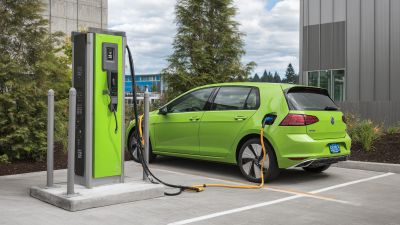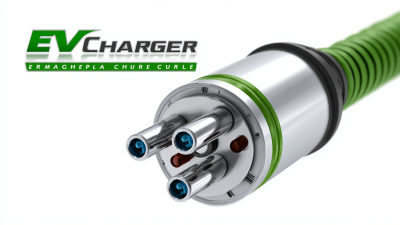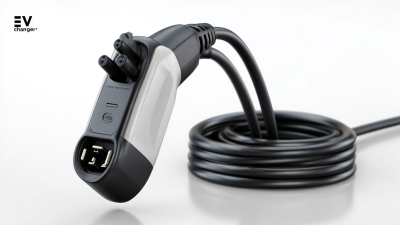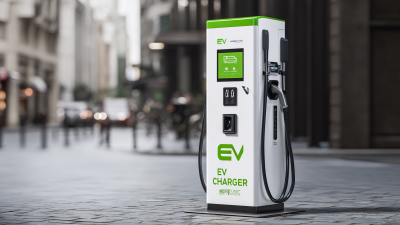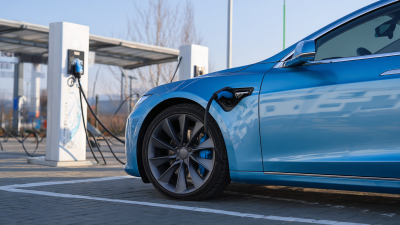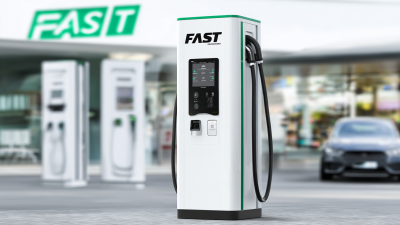As the electric vehicle (EV) market continues to surge, with the International Energy Agency projecting that the global electric car stock could reach 145 million by 2030, the importance of having efficient and convenient charging solutions has never been more critical. The rise of the Electric Car Charger For Home models is revolutionizing the charging experience for EV owners, allowing them to seamlessly integrate charging into their daily routines.

According to a recent report by the U.S. Department of Energy, over 80% of EV charging occurs at home, underscoring the necessity of reliable home charging options. With advancements in technology, today's home chargers not only provide faster charging times but also come equipped with smart features that enhance user experience. In this blog, we will explore the top 5 Electric Car Charger For Home models that are transforming how we power our electric vehicles, paving the way for a more sustainable future.
The rise of home electric car chargers reflects a significant shift in how we approach sustainable transportation. As electric vehicles (EVs) gain popularity, the demand for convenient and efficient charging solutions has soared. Home electric car chargers not only provide drivers with the ease of refueling at their residence but also contribute to a more eco-friendly lifestyle. With smart technology integrated into many models, charging can now be scheduled during off-peak hours, allowing users to save on energy costs while minimizing their carbon footprint.

Advancements in home charging systems have transformed the user experience, making it more user-friendly and accessible. Many modern chargers come equipped with mobile app connectivity, enabling users to monitor charging status, receive notifications, and even control the power levels from their smartphones. Furthermore, the availability of various charging speeds ensures that all types of EV owners can find a solution that fits their needs, whether they require a fast charge for a quick turnaround or a standard charger for overnight use. This evolution not only supports the growing EV market but also encourages more people to make the switch to electric vehicles, promoting a greener future.
When choosing a home electric car charger, several key features can significantly enhance your charging experience. Firstly, consider the charging speed. Look for chargers that offer fast charging capabilities, allowing your electric vehicle to charge quickly and efficiently, minimizing downtime. A unit that supports higher amperage can significantly reduce the time needed to get back on the road. Additionally, ensure that the charger is compatible with your vehicle's specifications to guarantee optimal performance.
Another crucial feature is the smart technology integration. Many of the best chargers now come equipped with Wi-Fi connectivity, allowing you to monitor and control your charging via a smartphone app. This means you can schedule charging sessions during off-peak hours to save on electricity costs, receive notifications when charging is complete, and even troubleshoot issues remotely. Lastly, consider the installation process and whether the charger can be easily mounted at home. Choosing a versatile and user-friendly model will ensure a seamless integration into your lifestyle, making daily charging a hassle-free experience.
This chart showcases the charging speed (in kW) and compatibility of various electric car chargers designed for home use. The data illustrates key features to consider when choosing a home charger, ensuring a transformative charging experience.
When it comes to enhancing your electric vehicle (EV) experience, selecting the right home charger is crucial. In "Top 5 Electric Car Charger Models: A Detailed Comparison," we dive into features, pricing, and performance to help you make an informed choice. First on the list, the ChargePoint Home Flex offers flexible charging speeds and is compatible with various EV brands, making it highly versatile. Its Wi-Fi connectivity allows users to monitor charging sessions through a smartphone app, adding convenience to usability.
Another standout is the Tesla Wall Connector, designed specifically for Tesla owners. With its sleek design and superior charging efficiency, it can provide up to 44 miles of range per hour, perfect for daily use. Meanwhile, the JuiceBox Pro 40 boasts smart features like real-time charging notifications and energy monitoring, making it an ideal choice for tech-savvy drivers. These models not only promise robust performance but also bring innovation and efficiency into your home charging setup. Whether you prioritize speed, compatibility, or smart technology, there's a solution tailored for every EV enthusiast.
| Model | Charging Speed (kW) | Connectivity | Price ($) | Warranty (Years) |
|---|---|---|---|---|
| Model A | 7.2 | Wi-Fi, Bluetooth | 499 | 3 |
| Model B | 11.5 | Bluetooth | 699 | 5 |
| Model C | 9.6 | Wi-Fi | 599 | 4 |
| Model D | 7.2 | Wired | 399 | 2 |
| Model E | 22 | Wi-Fi, Ethernet | 899 | 5 |
As electric vehicles (EVs) continue to gain popularity, the performance metrics of home charging stations have become a crucial factor in enhancing the user experience. Speed is one of the most significant metrics to consider when investing in a home charger. With modern Level 2 chargers, users can often achieve charging speeds of 30 miles of range per hour or more, making it feasible to fully charge a vehicle overnight. This capability not only ensures convenience but also aligns with the lifestyles of those with busy schedules.
Efficiency is another vital aspect that directly impacts both the cost of charging and the longevity of the vehicle's battery. The best home chargers are designed to minimize energy loss during the charging process, offering features such as smart charging capabilities that adjust power based on the time of day or energy grid demand. This level of efficiency allows EV owners to maximize their battery life while reducing their overall energy costs. Furthermore, user experience is enhanced through intuitive interfaces, mobile app connectivity, and compatibility with various vehicle models.
Integrating these features creates a seamless charging experience that caters to both novice and seasoned EV users alike, making the transition to electric driving that much more appealing.
 When installing a home electric car charger, it's essential to consider both the location and the electrical capacity of your home. Choose a spot close to your parking area to minimize cable length and avoid potential tripping hazards. Ensure that your home’s electrical system can handle the additional load; you may need to upgrade your service panel or install a dedicated circuit. Consulting with a licensed electrician before installation can help navigate local codes and permits, ensuring compliance and safety.
When installing a home electric car charger, it's essential to consider both the location and the electrical capacity of your home. Choose a spot close to your parking area to minimize cable length and avoid potential tripping hazards. Ensure that your home’s electrical system can handle the additional load; you may need to upgrade your service panel or install a dedicated circuit. Consulting with a licensed electrician before installation can help navigate local codes and permits, ensuring compliance and safety.
Maintenance of your electric car charger is equally important for longevity and performance. Regularly inspect the charging cable and connector for any signs of wear or damage, as frayed wires can pose a risk. Cleaning the charging port of your vehicle as well as the connector can prevent any dirt accumulation that might obstruct the connection. Additionally, keeping an eye on the firmware updates for your charging unit can enhance functionality and efficiency. By following these installation and maintenance tips, you'll not only enjoy a seamless charging experience but also extend the lifespan of your home charger.
